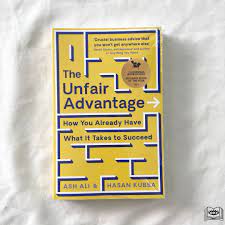Title: “Unfair Advantage” by Ash Ali and Hasan Kubba | Book Review
Review:
In “Unfair Advantage,” Ash Ali and Hasan Kubba offer a refreshing perspective on success in an often unfair world. They assert that life’s inequalities, including the role of timing, connections, and wealth, can either deter you or become the foundation for your success. The key, they argue, lies in developing an “unfair advantage.”
The central premise of the book revolves around four key pillars that enable entrepreneurs to excel and create a competitive edge:
1. Money: Having access to capital provides both time and resources to develop a product or service. While not everyone starts with ample funds, the authors suggest maximizing the value of your money. This might involve exploring cost-effective locations, creating a side income through freelancing, or even considering unconventional living arrangements to boost your financial runway.
2. Intelligence and Insight: Intelligence offers the advantage of problem-solving, but a deeper advantage lies in the ability to identify lucrative problems. Steve Jobs serves as an exemplar, noticing the need for beautiful, elegant, and simple electronic devices when few others did. The book encourages readers to cultivate insight by consistently seeking consumer pain points and asking questions that reveal the root causes, potentially uncovering unique product ideas.
3. Luck: Timing plays a significant role in startup success, with research indicating it can account for nearly half of the outcome. The authors argue that we can influence our luck by adopting a mindset that perceives events as unexpected opportunities. Believing you’re a lucky person can lead to proactive actions that enhance your fortunes. Reflecting on past instances of good luck and practicing gratitude further amplifies your ability to spot lucky opportunities.
4. Education and Status: Prestigious schools and organizations provide a significant advantage, but not everyone has access to them. The authors propose a self-directed learning journey as an alternative. By acquiring marketable skills and becoming an expert in seemingly unrelated fields, you can build your own education and status advantage. Learning is highlighted as the ultimate life heuristic, as it contributes to both personal growth and generosity, which enhances one’s reputation over time.
“Unfair Advantage” concludes with the assertion that success requires leveraging your unique advantages, regardless of your background. The book’s core message is that life may be unfair, but hard work alone is insufficient. To thrive, individuals must harness their inherent advantages and use them as catalysts for innovation, personal development, and building a lasting legacy.
In summary, “Unfair Advantage” is a thought-provoking guide that encourages readers to embrace the inequities of life as opportunities rather than obstacles. By developing their unfair advantages, individuals can position themselves for entrepreneurial success and personal growth, proving that, indeed, everyone has the potential to carve their own path to success in an often uneven world.
RESOURCES:
✅ 5% OFF AMAZON: https://bityl.co/KvcR
✅ TUBE BUDDY: https://bityl.co/KxKz
